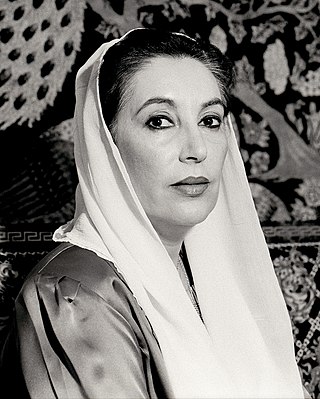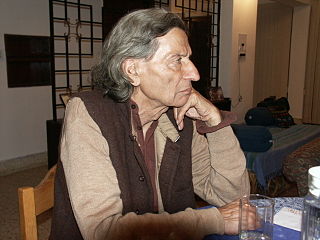India, officially the Republic of India, has full diplomatic relations with 201 states, including Palestine, the Holy See, and Niue. The Ministry of External Affairs (MEA) is the government agency responsible for the conduct of foreign relations of India. With the world's third largest military expenditure, second largest armed force, fifth largest economy by GDP nominal rates and third largest economy in terms of purchasing power parity, India is a prominent regional power and a rising superpower.

Benazir Bhutto was a Pakistani politician and stateswoman who served as the 11th and 13th prime minister of Pakistan from 1988 to 1990 and again from 1993 to 1996. She was the first woman elected to head a democratic government in a Muslim-majority country. Ideologically a liberal and a secularist, she chaired or co-chaired the Pakistan People's Party (PPP) from the early 1980s until her assassination in 2007.
Sabeer Bhatia is an Indian businessman who co-founded the first free web-based email service, Hotmail.com in 1996.

The Partition of India in 1947 was the change of political borders and the division of other assets that accompanied the dissolution of the British Raj in the Indian subcontinent and the creation of two independent dominions in South Asia: India and Pakistan. The Dominion of India is today the Republic of India, and the Dominion of Pakistan—which at the time comprised two regions lying on either side of India—is now the Islamic Republic of Pakistan and the People's Republic of Bangladesh. The partition was outlined in the Indian Independence Act 1947. The change of political borders notably included the division of two provinces of British India, Bengal and Punjab. The majority Muslim districts in these provinces were awarded to Pakistan and the majority non-Muslim to India. The other assets that were divided included the British Indian Army, the Royal Indian Navy, the Royal Indian Air Force, the Indian Civil Service, the railways, and the central treasury. Provisions for self-governing independent Pakistan and India legally came into existence at midnight on 14 and 15 August 1947 respectively.
Hinglish is the macaronic hybrid use of Indian English and the Hindustani language. Its name is a portmanteau of the words Hindi and English. In the context of spoken language, it involves code-switching or translanguaging between these languages whereby they are freely interchanged within a sentence or between sentences.

A princely state was a nominally sovereign entity of the British Indian Empire that was not directly governed by the British, but rather by an Indian ruler under a form of indirect rule, subject to a subsidiary alliance and the suzerainty or paramountcy of the British crown.

The Royal Indian Navy (RIN) was the naval force of British India and the Dominion of India. Along with the Presidency armies, later the Indian Army, and from 1932 the Royal Indian Air Force, it was one of the Armed Forces of British India.
Bhatia is a group of people and a caste found in Punjab, Sindh and Gujarat. Traditionally, they have been a trading and merchant community. The Bhatias primarily live in Northwestern India and Pakistan. The Bhatias, Lohanas and Khatris were similar communities and were known to intermarry. The Bhatias recruit Saraswat Brahmins as priests.

Independence Day is celebrated annually on 15 August as a public holiday in India commemorating the nation's independence from the United Kingdom on 15 August 1947, the day when the provisions of the Indian Independence Act, which transferred legislative sovereignty to the Indian Constituent Assembly, came into effect. India retained King George VI as head of state until its transition to a republic, when the Constitution of India came into effect on 26 January 1950 and replaced the dominion prefix, Dominion of India, with the enactment of the sovereign law Constitution of India. India attained independence following the independence movement noted for largely non-violent resistance and civil disobedience led by Indian National Congress under the leadership of Mahatma Gandhi who adopted these values from one of the early movements in India led by Ram Singh Kuka.

Raghunandan Lal Bhatia was an Indian politician. He was the Governor of Kerala from 23 June 2004 to 10 July 2008, and was the Governor of Bihar from 10 July 2008 to 28 June 2009. He signed the Border Peace and Tranquility Agreement with China on behalf of the Republic of India.

Sindhi cuisine refers to the distinct native cuisine of the Sindhi people from Sindh, Pakistan. Sindhi cuisine has been influenced by Central Asian, Iranian, Mughal food traditions. It is mostly a non-vegetarian cuisine, with even Sindhi Hindus widely accepting of meat consumption. The daily food in most Sindhi households consists of wheat-based flat-bread (phulka) and rice accompanied by two dishes, one gravy and one dry with curd, papad or pickle. Freshwater fish and a wide variety of vegetables are usually used in Sindhi cuisine. Restaurants specializing in Sindhi cuisine are rare, although it is found at truck stops in rural areas of Sindh province, and in a few restaurants in urban Sindh.

Keshav Malik was an Indian poet, art and literary critic, arts scholar, and curator. He remained art critic for the Hindustan Times (1960–1972) and The Times of India (1975–2000). He published eighteen volumes of poetry and edited six anthologies of English translations of Indian poetry.

South Asia is the southern subregion of Asia, which is defined in both geographical and ethnic-cultural terms. As commonly conceptualized, the modern states of South Asia include Afghanistan, Bangladesh, Bhutan, India, Maldives, Nepal, Pakistan, and Sri Lanka. South Asia borders East Asia to the northeast, Central Asia to the northwest, West Asia to the west and Southeast Asia to the east. Topographically, it is dominated by the Indian subcontinent and is bounded by the Indian Ocean in the south, and the Himalayas, Karakoram, and Pamir Mountains in the north.

The community of Indians in Oman includes Indian expatriates in Oman, as well as Omani citizens of Indian origin or descent.

Diplomatic relations between India and Paraguay were established in 1961.

India–Philippines relations, also knows as Indian-Filipino relations or Indo-Filipino relations, are the bilateral relations between the India and the Philippines. Diplomatic relations between India and the Philippines was established in 1949. India maintains an embassy in Manila, whilst the Philippines maintains one in New Delhi. A Treaty of Friendship was signed between the Philippines and India on 11 July 1952.

Jayati Bhatia is an Indian actress. She is best known for her role as Nirmala "Mataji" Bharadwaj in Sasural Simar Ka (2011–2018), one of the longest-running Indian television series ever, that aired on Colors TV. She also played Geetanjali Gopichand Oswal in Sasural Simar Ka 2 (2021–2023).
Bir Bhan Bhatia was an Indian physician and a former member of the Legislative Council of the United Provinces in the British India. The Government of India honoured him in 1954, with the award of Padma Shri, the fourth highest Indian civilian award for his contributions to medicine, placing him among the first recipients of the award.

Taniya Bhatia is an Indian cricketer. She is primarily a wicket-keeper. She plays for Punjab and India. She is currently trained under coach RP Singh. The International Cricket Council (ICC) named Bhatia as one of the five breakout stars in women's cricket in 2018.
The History of Indian foreign policy refers to the foreign relations of modern India post-independence, that is the Dominion of India (from 1947 to 1950) and the Republic of India (from 1950 onwards).













